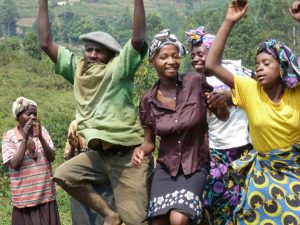Buhoma Village Walk is a great way to learn about the nature around Buhoma and the locals in their daily activities. This guided walk gives great insight into the traditional African way of life. Most visitors find interest to do village walk after gorilla tracking in Buhoma to discover how the locals live and survive.
Along the trail the guide clearly narrates their story on how they live, perform traditional beliefs, inspirational dances and songs, a traditional healer who prescribes cures for anything from the common cold to male impotency, banana wine and gin production, tea and coffee plantations, as well as the riverside walk and much. Such activities directly benefit members of the community. BOOK NOW

Local Communities in Buhoma
Buhoma Village walk exposes you to women create handicrafts at the crafts center, from here, we strongly recommend you to buy some of them, and those creating the baskets and other crafts will be most appreciative.
A waterfall in the middle of the farmland provides a respite for the eyes. You will also see how hard women are working in the fields tending to their crops, eking out an existence. There is no rotor-tiller – just a hoe and hard work.
Lucky enough, in harvest season see how tea is picked and how the skilled pickers pick just the newest leaves. These serene hillsides lend themselves to growing an excellent variety of tea – and indeed, you can take some home and enjoy it back in your country. As you sip it – you can recall your time at Bwindi Impenetrable Forest.
Along the River Munyaga, you will have an opportunity to see women washing clothes by hand, colorful butterflies, and water and forest bird species.
Visit the local Mukono Primary School along Buhoma village walk and meet children and the teachers – amazing how one can learn without electricity, lights, computers – but the most fantastic thing is the beautiful spirit of the children.
End your guided walk through visiting the Batwa cultural visit is an interesting and important opportunity to see and learn more about the Batwa cultural way of life. These people were forced out of the forests when the government nationalized them in 1991, and their rich and interesting traditions are now a thing of the past. The Batwa cultural experience gives you a chance to see how they lived for hundreds of years, as well as meet some of the community, and learn about the challenges they now face in cities/towns.
